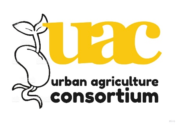1st September felt like the start of a new term as, after a year of meeting online as a bunch of 2D faces, our northern cluster of colleagues from our Pathfinder Cities met in person for the first time! We visited the Woodbank Community Food Hub which is part of the Kindling Trust and the site of their Farmstart which has been running there for 6 years on land belonging to Stockport Council which is free, because they see the multiple benefits Woodbank brings to the area, and the Council.
I (Maddy) was there from UAC, Hatty from the Landworkers Alliance (LWA) who we’re collaborating with on this project (it was Hatty’s 2nd day in her new role as Farmstart Network Coordinator!), Suzy from CSA Network (who is a member of our Core Oversight Group), Fran and Gareth from ShefFood and Regather, Bethan from Nottingham, Sonja from FoodWise Leeds, Ellen from Lancaster Food Futures and Joe and Catherine from Middlesbrough Environment City. It felt so nice, and important to meet in person and stoke our excitement about the possibilities this project could bring by working together to respond to the acute shortage of agroecological growers in the UK and the role cities can play in bringing people and food together in this way.
All of those who met (and they’re not the only ones) have expressed a desire to establish successful farmstarts in their cities. This is what UAC is trying to support and enable.
Lancaster is three years ahead and have started training and harvesting this year. Since the Spring, UAC and The LWA have coordinated a series of workshops for this group, to support them through the Farmstart feasibility stage, bringing an array of amazing teachers from existing Farmstarts: OrganicLea, Tamar Grow Local, Mach Maethlon and Kindling Trust. The next stage will be to source funding to employ a farmstart development worker in each city. We think that the government’s new entrant support scheme might be a good fit for this!
At Woodbank we all met with Chris Walsh, co-founder of Kindling, and he guided us round the site and gave us insight into the way things are done and why, how the Farmstarter trainees, beekeepers and community growers make space for each other, how the training works, what they have learnt along the way and where they want to go from here. The produce grown on site currently goes to Veg Box People which distributes about 400 organic veg bags.
Their key learning is:
- To first of all be a successful commercial enterprise and generate good levels of income
- To support and engage new farmstart trainees, and develop the farmstart programme from this place of viability
- It shouldn’t be one person leading the growing and training on a site, it should be two roles for two people.
- It’s good to partner with others (e.g Stockport Beekeepers, Glebelands, Community groups) to make best use of the site.
- Recognise the skills and knowledge in your local community
- Zone your site in terms of time and space so all users can interact well.
- There is a real shortage of trainers.
- Having a good reciprocal relationship with the local council is hugely beneficial.
Their key aims going forward from here are:
- To grow all year round
- To do their own composting (they currently only use green municipal waste)
- To use much less plastic
- To have no bare soil and condition the soil more
- To cycle nutrients better – still too linear.
They have decided not to seed save at this time because, Chris said, it would be too risky, in terms of the reliability of the crops.
After experiencing the complexity and slow pace of the Greater Manchester Food Partnership, Kindling made a decision to concentrate their energy and time into the needs of their own projects; what needed to be given to the land, the business and each other. Having in Summer 2021 raised over £1m in community shares to buy a peri-urban farm, this self-care has paid off. They are a little way off securing a farm site since the original landowner they were hoping to buy from had a change of circumstances. They are looking at an alternative site.





